Critical Review on Cultural Intelligence in Cross Cultural Management
Write a literature review of empirical work focusing on international/cross-cultural management and/or work, with a critical review of recent empirical research using one of the specified theoretical constructs.
21 Pages6764 Words33 Views
Added on 2023-01-12
About This Document
This critical review explores the concept of cultural intelligence in cross cultural management. It discusses the challenges and implications of managing across cultures and provides summaries of primary researches on the topic. The review highlights the theories and approaches followed by research scholars in writing research papers.
Critical Review on Cultural Intelligence in Cross Cultural Management
Write a literature review of empirical work focusing on international/cross-cultural management and/or work, with a critical review of recent empirical research using one of the specified theoretical constructs.
Added on 2023-01-12
ShareRelated Documents
Critical Review
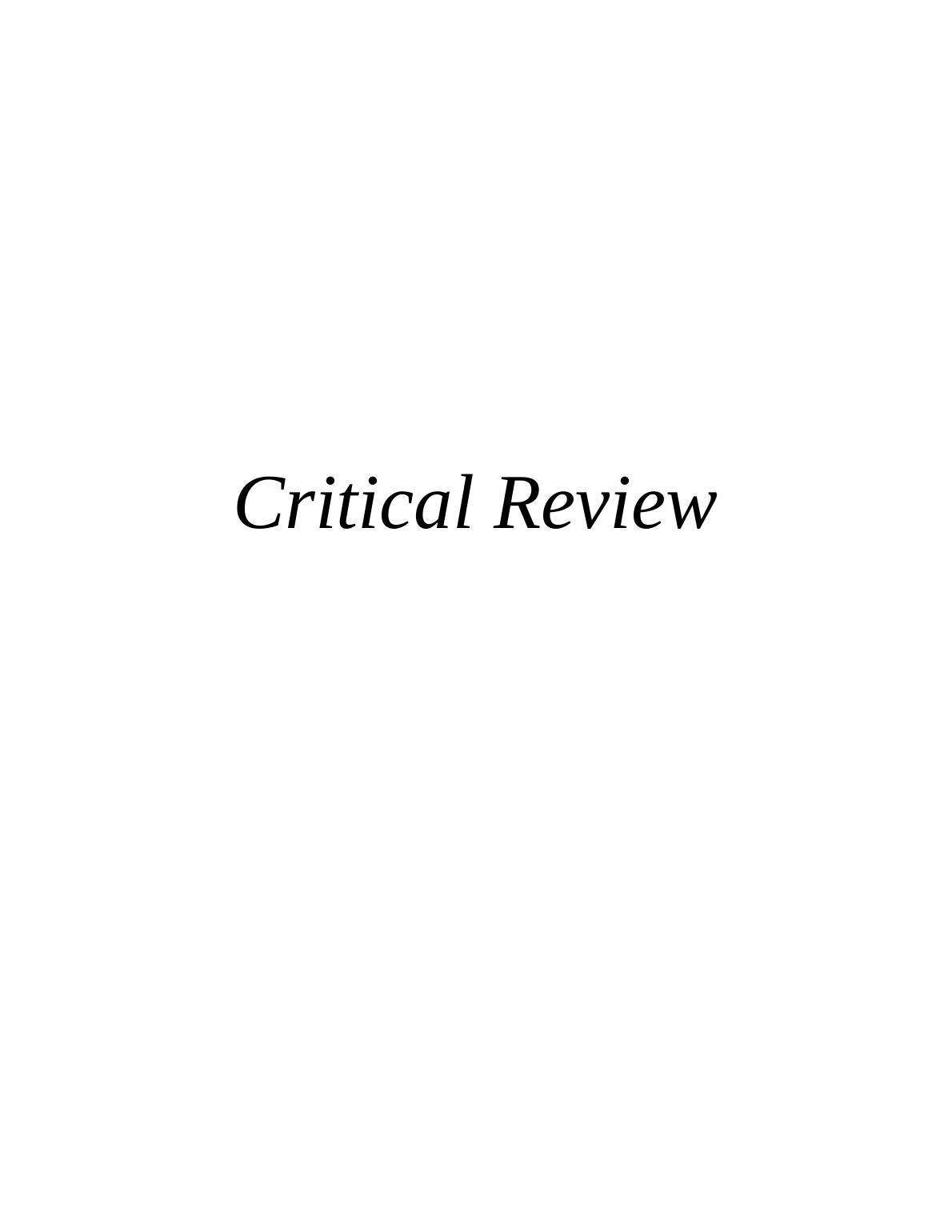
Table of Contents
INTRODUCTION...........................................................................................................................1
MAIN BODY...................................................................................................................................1
Summary of primary researches.............................................................................................1
CONCLUSION..............................................................................................................................10
REFERENCES..............................................................................................................................11
APPENDICES ..............................................................................................................................12
INTRODUCTION...........................................................................................................................1
MAIN BODY...................................................................................................................................1
Summary of primary researches.............................................................................................1
CONCLUSION..............................................................................................................................10
REFERENCES..............................................................................................................................11
APPENDICES ..............................................................................................................................12
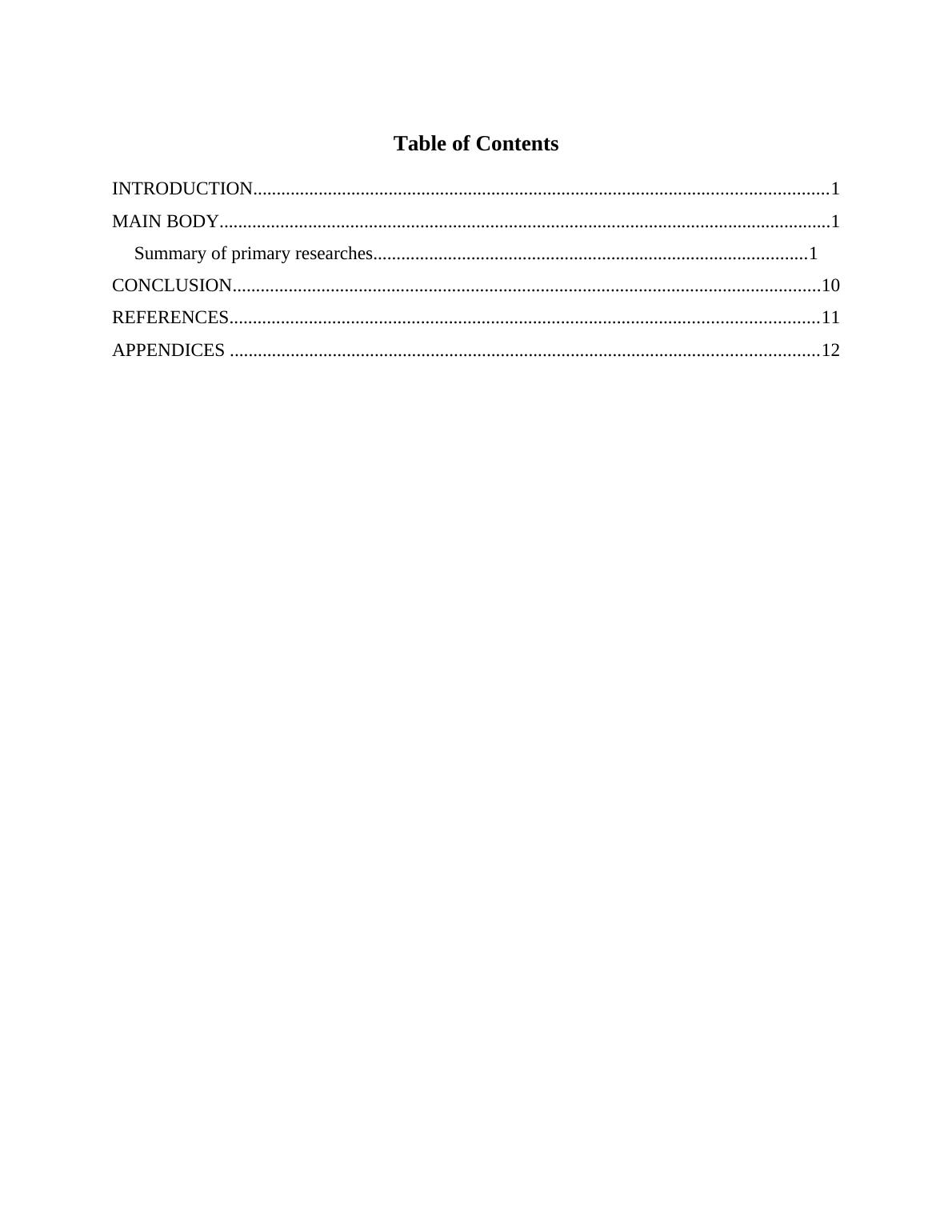
INTRODUCTION
Understanding about managing across cultures provides an insight about critical cross
cultural challenges faced by global organisation. Critical review is related to recognising addition
to understanding beliefs, behaviours, attitude and values of group of individual as well as their
abilities to apply knowledge about distinct cultures for achieving particular objectives
(Presbitero, 2016). The theoretical construct chosen for literature review is cultural intelligence
which is a wide topic. It is characterised as crucial and well as essential aspect that requires
immediate actions about some situations. It enables people to frame decisions which provides
timely together with appropriate response to actions by others. The review highlights about
theories and approaches followed by research scholars in writing research papers. The review
includes evaluation of numerous primary researches for the topic and various methodological
approaches, contexts and impacts on cross cultural management that are discussed in the articles.
It also includes a literature matrix table.
MAIN BODY
Summary of primary researches
As per the viewpoints of Earley (2002), it has been reviewed that cultural intelligence
plays essential role in intercultural management. The chosen methodological area by the
researcher was United States and research methodological tool is questionnaire method. It is the
potentials of an individual to adapt new as well as diverse cultural contexts as well as operate
will in cross cultural environment. It is also said that cultural intelligence as has major four
dimensions that are related to awareness, knowledge, interests, self efficacy and behaviours
(Earley, 2002). Further, there are various implications for cultural intelligence for certain
international organisations. It also improves communication, cooperation, performance as well as
workings of team. Addition to this, cultural intelligence helps international businesses to gain
competitive edge. It also allows access to a business for wider range of resources, equipments
and tools than an entity which has low cultural intelligence cam access. When compared with
findings of Ang and Van Dyne (2015), it is analysed that the author provides information about
various conception as well as definitional hurdles, applying cultural intelligence and assessment
approaches in domains related to international along with cross cultural management and
managing domestic practices. However, from the results of research of Earley (2002), it is
1
Understanding about managing across cultures provides an insight about critical cross
cultural challenges faced by global organisation. Critical review is related to recognising addition
to understanding beliefs, behaviours, attitude and values of group of individual as well as their
abilities to apply knowledge about distinct cultures for achieving particular objectives
(Presbitero, 2016). The theoretical construct chosen for literature review is cultural intelligence
which is a wide topic. It is characterised as crucial and well as essential aspect that requires
immediate actions about some situations. It enables people to frame decisions which provides
timely together with appropriate response to actions by others. The review highlights about
theories and approaches followed by research scholars in writing research papers. The review
includes evaluation of numerous primary researches for the topic and various methodological
approaches, contexts and impacts on cross cultural management that are discussed in the articles.
It also includes a literature matrix table.
MAIN BODY
Summary of primary researches
As per the viewpoints of Earley (2002), it has been reviewed that cultural intelligence
plays essential role in intercultural management. The chosen methodological area by the
researcher was United States and research methodological tool is questionnaire method. It is the
potentials of an individual to adapt new as well as diverse cultural contexts as well as operate
will in cross cultural environment. It is also said that cultural intelligence as has major four
dimensions that are related to awareness, knowledge, interests, self efficacy and behaviours
(Earley, 2002). Further, there are various implications for cultural intelligence for certain
international organisations. It also improves communication, cooperation, performance as well as
workings of team. Addition to this, cultural intelligence helps international businesses to gain
competitive edge. It also allows access to a business for wider range of resources, equipments
and tools than an entity which has low cultural intelligence cam access. When compared with
findings of Ang and Van Dyne (2015), it is analysed that the author provides information about
various conception as well as definitional hurdles, applying cultural intelligence and assessment
approaches in domains related to international along with cross cultural management and
managing domestic practices. However, from the results of research of Earley (2002), it is
1
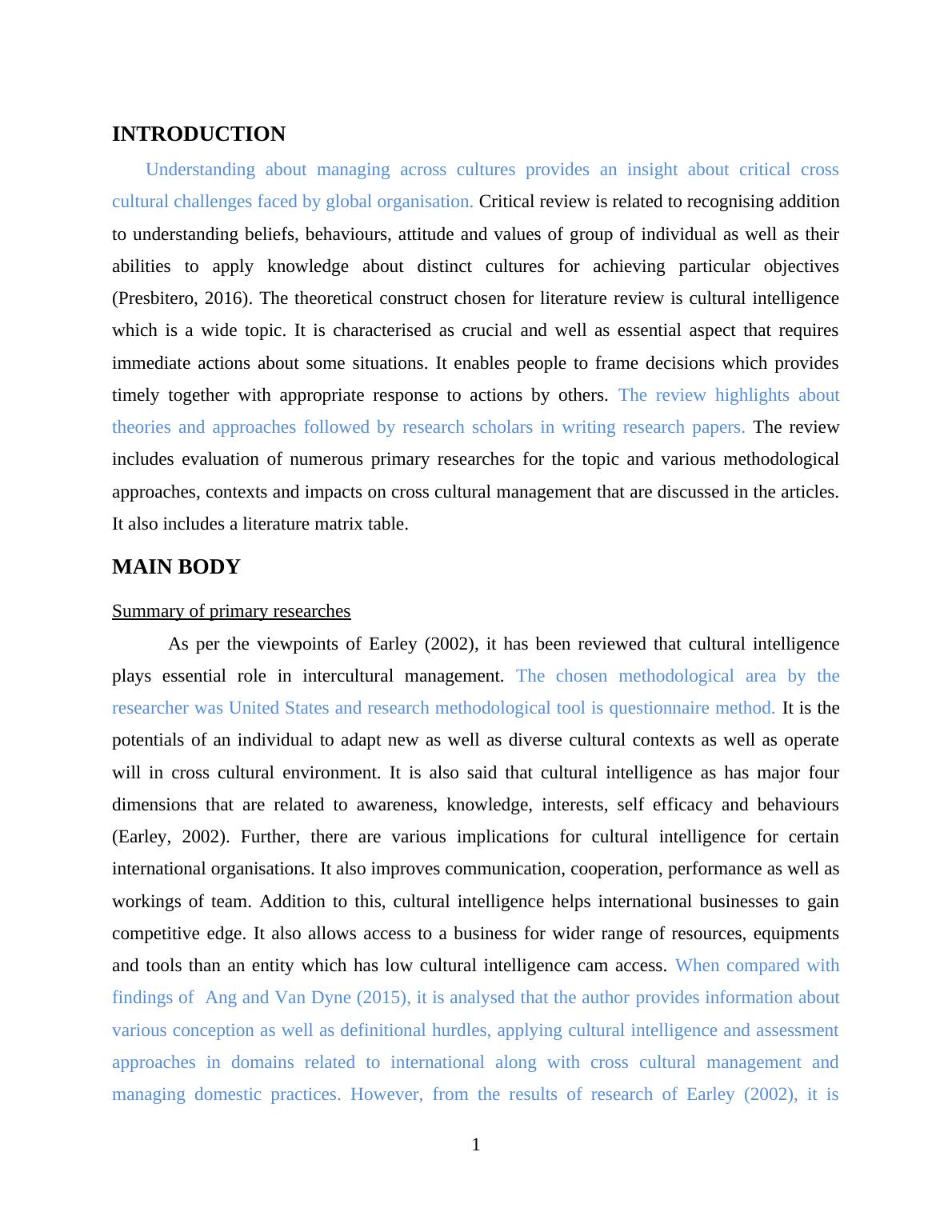
evaluated that this kind of intelligence involves interactions in effective modes with another
people that belongs to distinct cultures and shapes the way a person exhibits approaches in new
along with different cultural setting. The article has presented the implications of cultural
intelligence post its exploration. The study conducted has led to the inference that CQ is an
effective construct which is put to use for the purpose of improving the comprehension of inter
cultural interaction. It is reviewed that cultural intelligence is nothing but the capacity of an
individual to adapt themselves to a new kind of cultural setting in accordance with a number of
components such as motivational, cognitive, and behavioral features. The article has also
included the implications for cultural intelligence for a number of aspects of global companies.
According to study done by Box (2012) it is reviewed that cultural intelligence involves
various factors that have relationships with transformational leadership in company. In this
research, it is identified that selected mythological area is quantitative non experimental research
that investigates about issues of managers at Fortune 500 Company in Western United States. In
the research paper, it has been identified that the leaders that have higher cultural intelligence
level they are then to exhibit huge styles of transformational leadership at workplaces in order to
lead as well as manage people in more effective manner within multicultural environments. It
has been analyzed that the best predictors of transformational leaders are behavioral cultural
intelligence addition to cognitive cultural intelligence. It makes unique contribution in
nomological network that is concerned with cultural intelligence in an organization (Box, 2012).
Transformational leadership’s characteristics and idealized influences states willingness and
ability of leaders to develop subordinates as well as selflessness to motivate them for enhancing
their potentials for working with others in new culture and business environment. It is well said
that cultural intelligence is imperative in nature which implies that it increases requirements for
interrelationships across cultures. It also eradicates boundaries across cultures for the companies
that plan to go work with other entities at international level. The study of Box (2012) shows
findings that about relationship among factors of cultural intelligence and leaders which help
transformational leaders to manage and lead other people effectively and making position in
multicultural environment. In contract, finding of the research performed by Steernberg and
Grigorenko (2004) outlines various experiences in different years and eras that stated that
intelligence is displayed in cross cultural aspects. The article has demonstrated the issues
encountered by the managers at a Fortune 500 Organization situated within the Western US. The
2
people that belongs to distinct cultures and shapes the way a person exhibits approaches in new
along with different cultural setting. The article has presented the implications of cultural
intelligence post its exploration. The study conducted has led to the inference that CQ is an
effective construct which is put to use for the purpose of improving the comprehension of inter
cultural interaction. It is reviewed that cultural intelligence is nothing but the capacity of an
individual to adapt themselves to a new kind of cultural setting in accordance with a number of
components such as motivational, cognitive, and behavioral features. The article has also
included the implications for cultural intelligence for a number of aspects of global companies.
According to study done by Box (2012) it is reviewed that cultural intelligence involves
various factors that have relationships with transformational leadership in company. In this
research, it is identified that selected mythological area is quantitative non experimental research
that investigates about issues of managers at Fortune 500 Company in Western United States. In
the research paper, it has been identified that the leaders that have higher cultural intelligence
level they are then to exhibit huge styles of transformational leadership at workplaces in order to
lead as well as manage people in more effective manner within multicultural environments. It
has been analyzed that the best predictors of transformational leaders are behavioral cultural
intelligence addition to cognitive cultural intelligence. It makes unique contribution in
nomological network that is concerned with cultural intelligence in an organization (Box, 2012).
Transformational leadership’s characteristics and idealized influences states willingness and
ability of leaders to develop subordinates as well as selflessness to motivate them for enhancing
their potentials for working with others in new culture and business environment. It is well said
that cultural intelligence is imperative in nature which implies that it increases requirements for
interrelationships across cultures. It also eradicates boundaries across cultures for the companies
that plan to go work with other entities at international level. The study of Box (2012) shows
findings that about relationship among factors of cultural intelligence and leaders which help
transformational leaders to manage and lead other people effectively and making position in
multicultural environment. In contract, finding of the research performed by Steernberg and
Grigorenko (2004) outlines various experiences in different years and eras that stated that
intelligence is displayed in cross cultural aspects. The article has demonstrated the issues
encountered by the managers at a Fortune 500 Organization situated within the Western US. The
2
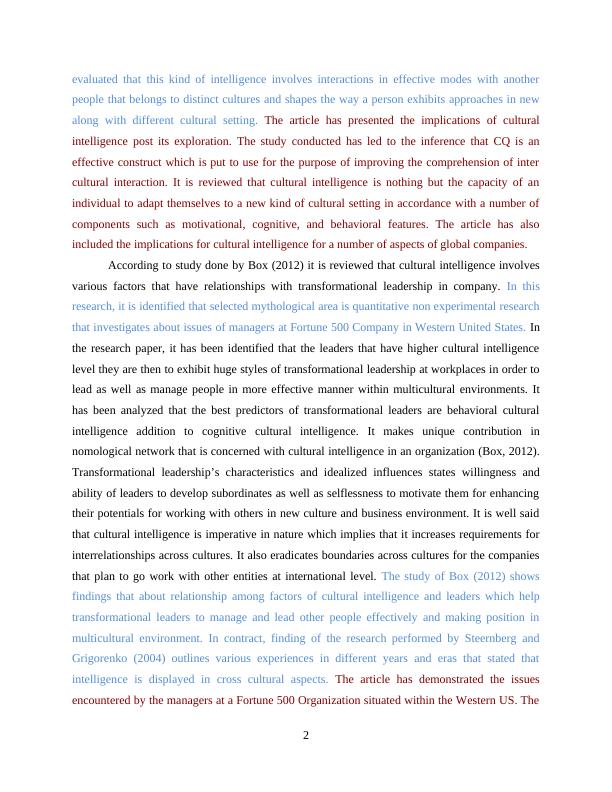
issues arise mainly owing to the non awareness and insensitivity towards the cultural
backgrounds of the employees during the business practices as well as activities. It has further
been reviewed on the basis of the article that the leadership competence within the 21st century is
missing out a cultural aspect, while the actions should comprise of foreign comprehensions along
with behavioral adjustments during the corporate practices. The paper has presented the
calculation of an ANOVA between the constructs of Transformational Leadership and Cultural
Intelligence. It is determined that the latter is more important for leader to provide guidance to a
company in successfully carrying out its operations in future context.
As per Ang and Van Dyne (2015), it is reviewed that cultural intelligence is ability of a
person to function in effective situations that are characterized through cultural diversity. The
selected methodological area by the researcher for the research is New York and methodology
adopted was polynomial regression along with response surface methodology on sample
graduate students from 35 different nationalities. The research was a state of science about
cultural intelligence as well as its relevance to manage diversity in both inside together with
across cultures. It is considered as inviolable resource which stimulates as well as guide for
future workings. It is applied across diverse range of disciplines, organizational behaviors,
intercultural communications, management, industrial addition to organizational psychology. In
today’s increasing diverse work settings, ability of a person to learn new and advance workings
is important for organizational employees for showing more efficiencies and intercultural
capabilities (Ang and Van Dyne, 2015). It also states about positions of cultural intelligence that
manages diversities at domestic and international level. From the research done by Ang and Van
Dyne (2015), it is found that individual capabilities have particular characteristics which
encourage all human capital to function effectively and also emphasis on national cultural norms,
practices, beliefs and many more. In contrary, study of Imai and Gelfand, (2010) shows findings
about negotiation process and the theories that are majorly used for the purpose of managing
cross culture within negotiation and its outcomes are evaluated in effective modes. The review of
the contents of this book has laid down the inference that cultural intelligence is the ability of a
person towards functioning in an effective manner in the circumstances which are characterized
by the culture diversity. The book consists of an expanse of knowledge demonstrating cultural
intelligence and its significance for management of diversity across as well as in cultures. It is
known that the capability of cultural intelligence can be substantially inflated via education as
3
backgrounds of the employees during the business practices as well as activities. It has further
been reviewed on the basis of the article that the leadership competence within the 21st century is
missing out a cultural aspect, while the actions should comprise of foreign comprehensions along
with behavioral adjustments during the corporate practices. The paper has presented the
calculation of an ANOVA between the constructs of Transformational Leadership and Cultural
Intelligence. It is determined that the latter is more important for leader to provide guidance to a
company in successfully carrying out its operations in future context.
As per Ang and Van Dyne (2015), it is reviewed that cultural intelligence is ability of a
person to function in effective situations that are characterized through cultural diversity. The
selected methodological area by the researcher for the research is New York and methodology
adopted was polynomial regression along with response surface methodology on sample
graduate students from 35 different nationalities. The research was a state of science about
cultural intelligence as well as its relevance to manage diversity in both inside together with
across cultures. It is considered as inviolable resource which stimulates as well as guide for
future workings. It is applied across diverse range of disciplines, organizational behaviors,
intercultural communications, management, industrial addition to organizational psychology. In
today’s increasing diverse work settings, ability of a person to learn new and advance workings
is important for organizational employees for showing more efficiencies and intercultural
capabilities (Ang and Van Dyne, 2015). It also states about positions of cultural intelligence that
manages diversities at domestic and international level. From the research done by Ang and Van
Dyne (2015), it is found that individual capabilities have particular characteristics which
encourage all human capital to function effectively and also emphasis on national cultural norms,
practices, beliefs and many more. In contrary, study of Imai and Gelfand, (2010) shows findings
about negotiation process and the theories that are majorly used for the purpose of managing
cross culture within negotiation and its outcomes are evaluated in effective modes. The review of
the contents of this book has laid down the inference that cultural intelligence is the ability of a
person towards functioning in an effective manner in the circumstances which are characterized
by the culture diversity. The book consists of an expanse of knowledge demonstrating cultural
intelligence and its significance for management of diversity across as well as in cultures. It is
known that the capability of cultural intelligence can be substantially inflated via education as
3
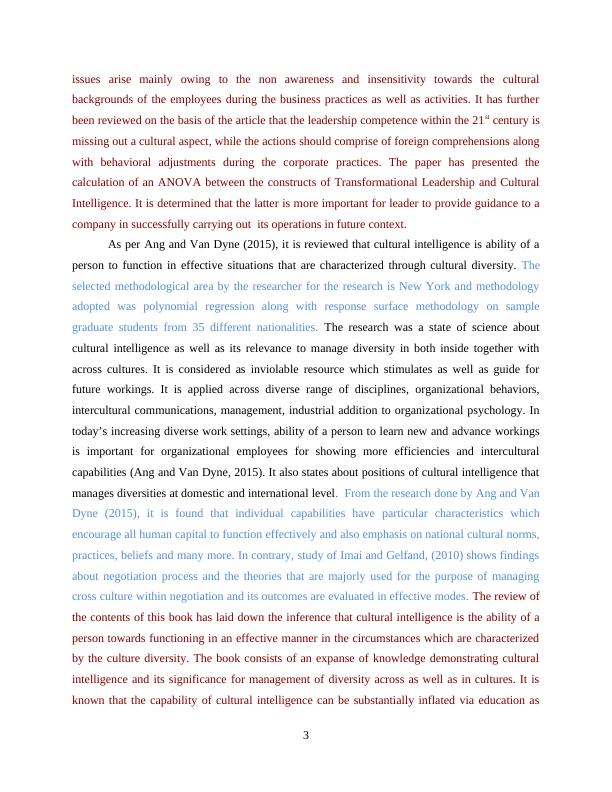
well as experience. Thus, the book focuses upon the individual capabilities which are the traits
enabling individuals to operate in culturally diverse context.
As per Triandis (2006) it is reviewed that interactions in successful manner needs cultural
intelligence. The essential area of methodology of research was of 500 people that have
belonging to distinct companies by using questionnaire method. The study states that cultural
intelligence is said to behaviors which are considered intelligent as per particular culture. It is
also termed as traits and skills on a person who quickly adjusts, interacts intensively and takes
minimum stresses other than the people who are socialized. Various cultural intelligence aspects
which are part of a company involve suspending judgment, paying attention to circumstances,
increasing isomorphic attributions and many more. In 21st century, big or large sized entities are
multicultural. Hereby, products are conceived as well as designed in one nations, manufactured
in around 10 nations and promoted or marketed in approx 100 nations. This results in various
dyadic relationships in which cultures of two or more members generally differs (Triandis,
2006). Moreover, there are various attributes that plays important aspects in attaining cultural
intelligence. From the study of Triandis (2006), it is originated that the uses of the concept are
analyzed as relatable it is due to the people who wishes to become sensitive with others through
examining intelligence and make adjustments in own behaviors while experiences cross cultural
management. However, results of the study done by Earley (2002) shows that cultural
intelligence engrosses connections in helpful style with another people to facilitate belongs to
separate customs and shapes the technique a person displays approaches in novel along with
diverse cultural surroundings. The review of the article leads to the inference that success
interaction across the cultures need cultural intelligence. The paper has described many
components of cultural intelligence like suspension of judgments till availability of adequate data
about the other individual, cross culture training increasing isomorphic attributions, suitable
behaviours and affect, and so on. So, it can be said that all of these are important to be taken into
account in order to interact across cultures.
As per Thomas and Et. Al. (2015), it has been reviewed that cultural intelligence is an
individual latent factor which is based on three intermediate facets. The selected methodological
area by the investigator for the research is United States and the validity of scale is with 3526
participants in different language groups around the nation. It is perceived that link of a culture
to organisational behaviour is considered as one of distinctive characteristic in field of
4
enabling individuals to operate in culturally diverse context.
As per Triandis (2006) it is reviewed that interactions in successful manner needs cultural
intelligence. The essential area of methodology of research was of 500 people that have
belonging to distinct companies by using questionnaire method. The study states that cultural
intelligence is said to behaviors which are considered intelligent as per particular culture. It is
also termed as traits and skills on a person who quickly adjusts, interacts intensively and takes
minimum stresses other than the people who are socialized. Various cultural intelligence aspects
which are part of a company involve suspending judgment, paying attention to circumstances,
increasing isomorphic attributions and many more. In 21st century, big or large sized entities are
multicultural. Hereby, products are conceived as well as designed in one nations, manufactured
in around 10 nations and promoted or marketed in approx 100 nations. This results in various
dyadic relationships in which cultures of two or more members generally differs (Triandis,
2006). Moreover, there are various attributes that plays important aspects in attaining cultural
intelligence. From the study of Triandis (2006), it is originated that the uses of the concept are
analyzed as relatable it is due to the people who wishes to become sensitive with others through
examining intelligence and make adjustments in own behaviors while experiences cross cultural
management. However, results of the study done by Earley (2002) shows that cultural
intelligence engrosses connections in helpful style with another people to facilitate belongs to
separate customs and shapes the technique a person displays approaches in novel along with
diverse cultural surroundings. The review of the article leads to the inference that success
interaction across the cultures need cultural intelligence. The paper has described many
components of cultural intelligence like suspension of judgments till availability of adequate data
about the other individual, cross culture training increasing isomorphic attributions, suitable
behaviours and affect, and so on. So, it can be said that all of these are important to be taken into
account in order to interact across cultures.
As per Thomas and Et. Al. (2015), it has been reviewed that cultural intelligence is an
individual latent factor which is based on three intermediate facets. The selected methodological
area by the investigator for the research is United States and the validity of scale is with 3526
participants in different language groups around the nation. It is perceived that link of a culture
to organisational behaviour is considered as one of distinctive characteristic in field of
4
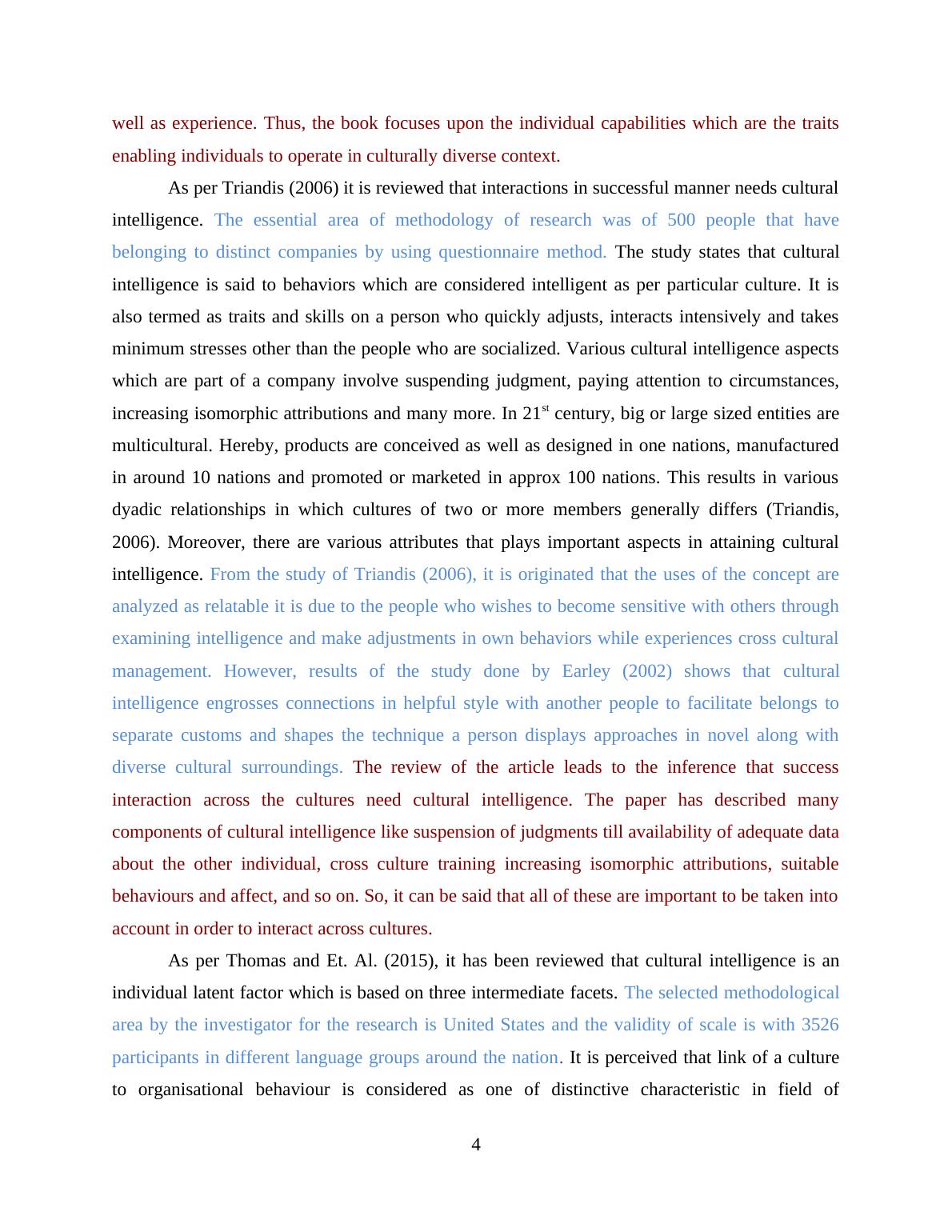
End of preview
Want to access all the pages? Upload your documents or become a member.
Related Documents
Cultural Distance as a Cultural Constructlg...
|12
|3486
|3
Global Leadership and Cross-Cultural Managementlg...
|8
|2437
|322
Cultural diversity and equalitylg...
|40
|8010
|78
Organizational Culture Assignmentlg...
|60
|13773
|43
Personality Traits and Negotiation Style: Impact on Cultural Contextlg...
|5
|1109
|427
Cultural Intelligence: How Can We Managing Workforce Diversity and Integration across Multicultural Teams?lg...
|18
|4314
|395
